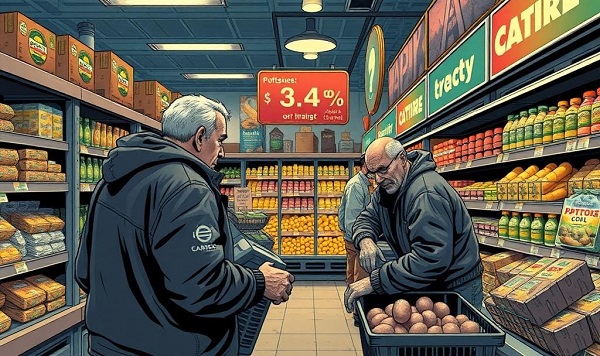From the Frontier Centre for Public Policy
By Ian Madsen
Rising OAS and GIS costs outpacing economic growth, straining the federal budget
Canada’s aging population is creating a financial crisis that policymakers cannot afford to ignore. The rising costs of Old Age Security (OAS) and the Guaranteed Income Supplement (GIS) pose a growing risk to federal finances, yet no dedicated funding has been established to ensure their long-term viability.
The numbers are staggering. The 2024 Financial Accounts (Public Accounts of Canada, Volume I, p. 43) show that spending on elderly benefits rose at a compound annual growth rate (CAGR) of 6.24 per cent between 2015 and 2024, climbing from $44.1 billion to $76.04 billion. Over the same period, total federal program spending increased at a CAGR of 7.24 per cent, from $248.7 billion to $466.7 billion.
Although elderly benefits made up 17.7 per cent of total program spending in 2015, they now account for 16.3 per cent. This decline is not due to reduced spending but rather a surge in pandemic-related government expenditures, which temporarily outpaced OAS-GIS growth. Nevertheless, the trajectory is clear: elderly benefits are now the federal government’s third-largest expense, behind only ‘Other Transfer Payments’ and ‘Operating Expenses.’
While these figures already indicate a growing fiscal challenge, government projections suggest the problem will only get worse. According to the federal Fall Economic Statement (Table A1.11, p. 211), economic growth is expected to average four per cent annually until 2029-30. Yet OAS-GIS costs are projected to grow at a compound annual growth rate of 6.5 per cent, outpacing both GDP growth and other program spending. By 2029-30, spending on elderly benefits is expected to reach $104.4 billion, or 18.3 per cent of all program expenditures.
Government projections highlight the rapid growth in elderly benefits over the next six years, as shown in the table below:
Fiscal Year Elderly Benefits ($B) Total Program Expenses ($B) Percentage of Total Program Expenses
2023-24 76.0 466.7 16.2 per cent
2024-25 80.9 485.7 16.7 per cent
2025-26 85.5 500.3 17.1 per cent
2026-27 90.1 509.3 17.7 per cent
2027-28 94.6 529.7 17.9 per cent
2028-29 99.5 549.7 18.1 per cent
2029-30 104.4 570.3 18.3 per cent
As the table shows, OAS-GIS spending is rising as a proportion of total government expenditures. This mirrors the original crisis in the Canada Pension Plan (CPP), when benefits outpaced contributions as the population aged.
The CPP once faced a similar sustainability crisis, and its reform in 1997 offers a potential model for addressing the challenges of OAS-GIS today. The federal government overhauled the CPP by creating the Canada Pension Plan Investment Board (CPPIB), which now manages $570 billion in assets. At the time, CPP benefits were paid through general government revenues rather than dedicated investments.
The solution involved higher contribution rates and the creation of an independent investment board to manage the fund sustainably.
These changes secured the CPP’s future, but OAS-GIS remains entirely dependent on government revenue, with no financial backing of its own. That makes it even more vulnerable to economic downturns and demographic shifts.
Policymakers must take decisive action to secure its future. One option is to tighten eligibility criteria to curb uncontrolled spending. Cost-of-living adjustments should also be limited to official inflation measures, ensuring sustainability without unfairly burdening low-income seniors.
The federal government must acknowledge the problem before it becomes unmanageable. The next finance minister should seek input from actuaries, investment professionals, economists and the public to explore feasible long-term solutions. A dedicated OAS-GIS Investment Board, similar to the CPPIB, could help ensure the program’s sustainability. The government already expanded CPP in 2019—there is precedent for such an approach.
Since OAS-GIS has no existing assets, the government will need to inject capital into the program. This could be done through annual surpluses deemed excessive for current needs or through long-term debt financing. Issuing 30-, 40- or even 50-year bonds specifically designed to fund OAS-GIS could provide a market-friendly, fiscally responsible path to solvency. If properly structured, such a plan could improve Canada’s credit rating rather than weaken it, ultimately reducing borrowing costs.
Even today, OAS-GIS spending exceeds the annual federal deficit, a clear warning sign that this issue can no longer be ignored. If no action is taken, Canada will face soaring elderly benefits with no sustainable way to fund them.
The time to act is now. Delaying reform will only make the crisis worse, burdening future generations with an unsustainable system. Policymakers have a choice: build a sustainable future for OAS-GIS or allow it to become a fiscal disaster.
Ian Madsen is the Senior Policy Analyst at the Frontier Centre for Public Policy.













